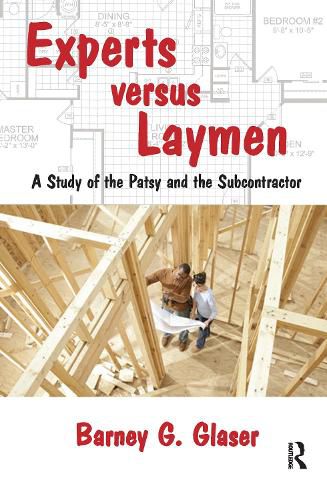Readings Newsletter
Become a Readings Member to make your shopping experience even easier.
Sign in or sign up for free!
You’re not far away from qualifying for FREE standard shipping within Australia
You’ve qualified for FREE standard shipping within Australia
The cart is loading…






This book studies the relationship and balance of power between experts and laymen. It is rooted in the author’s analysis of customer and contractor interactions in the housing industry, but relevant to other kinds of expert-layman relationships. Many of the conflicts between customer and contractor noted by the author also occur in lawyer-client, student-teacher, and doctor-patient relations.
The author’s research is structured around three core categories pertaining to experts’ relations with laymen: choosing experts, power symmetry, and what he calls elsewhereism. The first category has to do with seeking experts, finding them, referrals, and judging whether or not to use experts. Power symmetry concerns the inherent imbalance of power between an expert and a layman. Elsewhereism focuses on the constant competition that laymen face with unseen others in claiming the time and services of an expert.
Experts versus Laymen broadens the analysis of expert-layman phenomena far beyond similar studies. It examines processes of bidding, gaining information, inspecting and evaluating work, winning trust, bargaining over costs, and determining who has situational control. This book discusses not only the contracting process in the housing industry, but-far more important-a world of power and domination in expert-laymen relationships.
$9.00 standard shipping within Australia
FREE standard shipping within Australia for orders over $100.00
Express & International shipping calculated at checkout
This book studies the relationship and balance of power between experts and laymen. It is rooted in the author’s analysis of customer and contractor interactions in the housing industry, but relevant to other kinds of expert-layman relationships. Many of the conflicts between customer and contractor noted by the author also occur in lawyer-client, student-teacher, and doctor-patient relations.
The author’s research is structured around three core categories pertaining to experts’ relations with laymen: choosing experts, power symmetry, and what he calls elsewhereism. The first category has to do with seeking experts, finding them, referrals, and judging whether or not to use experts. Power symmetry concerns the inherent imbalance of power between an expert and a layman. Elsewhereism focuses on the constant competition that laymen face with unseen others in claiming the time and services of an expert.
Experts versus Laymen broadens the analysis of expert-layman phenomena far beyond similar studies. It examines processes of bidding, gaining information, inspecting and evaluating work, winning trust, bargaining over costs, and determining who has situational control. This book discusses not only the contracting process in the housing industry, but-far more important-a world of power and domination in expert-laymen relationships.